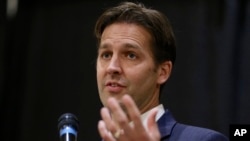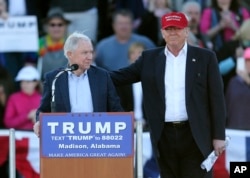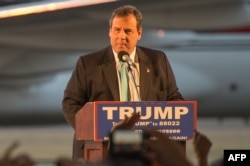On Super Tuesday, as U.S. voters choose their Republican and Democratic presidential candidates in at least 11 states and one territory, Republican frontrunner Donald Trump will again be in the spotlight.
Recent polls show Trump leading in every state except Texas, where Texas Senator Ted Cruz is ahead in most surveys. With Trump set to further cement his commanding lead in the Republican race, some lawmakers are taking a stand on his candidacy.
Freshman Republican Senator Ben Sasse of Nebraska posted an open letter to Trump’s supporters on Facebook outlining why he will not support Trump if he wins the nomination.
Citing Trump’s refusal to disavow the endorsement of white supremacist and former KKK Grand Master David Duke in a CNN interview Sunday, Sasse wrote: “A presidential candidate who boasts about what he will do during his “reign” and refuses to condemn the Klu Klux Klan cannot lead a conservative movement in America.”
Sasse wrote that he cannot support Trump or the Democratic frontrunner Hillary Clinton, adding: “If Donald Trump ends up as the GOP [Republican] nominees, conservatives will need to find a third option. Sasse told Trump’s supporters they have a right to be angry, but insisted that Trump is not the right candidate. He accused Trump of “dividing Americans and tearing down rather than building back up this glorious nation.”
Sasse was elected to the Senate in 2014 as a conservative Tea Party challenger. His clear rejection of Trump came only hours after Republican Senator Jeff Sessions of Alabama became the first sitting U.S. senator to endorse Trump.
Sessions joined Trump at a rally in Alabama, putting on a red “Make America Great Again” cap and saying: “At this time in America’s history, we need to make America great again!” Sessions praised Trump as the man who can finally deal with illegal immigration and securing the U.S. southern border with Mexico.
The Alabama senator has long been tough on opposing comprehensive immigration reform efforts in the Senate, condemning what he terms “amnesty” for illegal immigrants. He is a member of the Senate Judiciary Committee.
At the rally, Trump was thrilled, saying: “I’m becoming mainstream. All these people are now endorsing me.”
Trump picked up a key endorsement on Friday from recent Republican rival and New Jersey Governor Chris Christie. In recent weeks, Christie had blasted Trump for calling for a ban on Muslims to the United States and for saying he would build a huge wall on the border with Mexico and make Mexico pay for it.
Now, Christie has been accused by a number of Republicans of blatant political opportunism. He says Trump is the strongest Republican candidate to face Democratic frontrunner Clinton in the November general election.
Former Republican presidential nominee Mitt Romney blasted Trump on Twitter Monday, tweeting: “A disqualifying and disgusting response by Donald Trump to the KKK. His coddling of repugnant bigotry is not in the character of America.”
Two House Republicans have endorsed Trump – Representatives Chris Collins of New York and Duncan Hunter of California.
A long list of Republican U.S. senators and House members has endorsed Florida Senator Marco Rubio in the presidential race, and a few House members have endorsed Texas Senator Ted Cruz.















